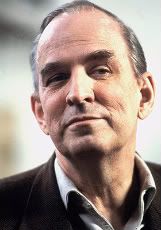The Retrospective of the 61st Berlin International Film Festival will honour Swedish director Ingmar Bergman, who died in 2007.
 The Retrospective will present some of Bergman’s films for the screen as well as a sample of his works as a screenwriter. In addition it will show the documentaries made by Swedish filmmaker and Bergman-connoisseur Stig Björkman, who portrayed Bergman both in front of and behind the camera. Thanks to the Swedish Film Institute and the Swedish Institute, the prints screening in the Retrospective are virtually new. A further thank you goes to the right holders AB Svensk Filmindustri for their kind support. To supplement the film programme, there will also be a series of events with lectures and discussion panels.
The Retrospective will present some of Bergman’s films for the screen as well as a sample of his works as a screenwriter. In addition it will show the documentaries made by Swedish filmmaker and Bergman-connoisseur Stig Björkman, who portrayed Bergman both in front of and behind the camera. Thanks to the Swedish Film Institute and the Swedish Institute, the prints screening in the Retrospective are virtually new. A further thank you goes to the right holders AB Svensk Filmindustri for their kind support. To supplement the film programme, there will also be a series of events with lectures and discussion panels.
The cinematic oeuvre of Bergman includes more than 60 works. Films such as The Silence (Tystnaden, 1962/63), Scenes from a Marriage (Scener ur ett äktenskap, 1972/73) and Fanny and Alexander (Fanny och Alexander, 1981/82 – which took home four Oscars) brought him international fame. He won nearly all of the world’s most prestigious film awards, including a Golden Bear for Wild Strawberries (Smultronstället, 1957) at the Berlinale in 1958. Ingmar Bergman was a self-reflexive artist of enormous creative power. As director he explored life’s existential questions and chronicled bourgeois society. Moreover as author, director (for the screen, stage and TV) and producer, Ingmar Bergman achieved – as young critics and later Nouvelle Vague directors formulated it – the status of a modern classic.
“Ingmar Bergman’s artistic productivity was astonishing. Over the decades he created a body of work that was at all times convincing in the way it took a clear and fresh look at the many facets of human behaviour. His films are highlights of European auteur cinema, and their stylistic and moral consistency are still exemplary today,” comments Retrospective Director, Rainer Rother, who is also Artistic Director of the Deutsche Kinemathek – Museum für Film und Fernsehen.
Bergman’s work may be viewed as a Gesamtkunstwerk: references, reflections and reversals are some of the stylistic devices used by this director who repeatedly drew on a superb ensemble of actors: Bibi Andersson, Harriet Andersson, Gunnar Björnstrand, Eva Dahlbeck, Erland Josephson, Gunnel Lindblom, Birger Malmsten, Ingrid Thulin, Liv Ullmann and Max von Sydow. And so thirty years after Scenes from a Marriage (Scener ur ett äktenskap, 1972/73), Liv Ullmann and Erland Josephson meet again as Marianne and Johan in Saraband (2002/03). This last film by Bergman will be presented in the Retrospective as an example of his many TV productions. The principle of continuity also played a huge role for Bergman in the visual composition of his films and led to his making twenty films with cameraman Sven Nykvist. One of these works was Persona (1965/66), Bergman’s uncompromising exploration of loneliness and identity.
“Ingmar Bergman’s versatility is just as extraordinary as his courage to break social taboos”, says Berlinale Director Dieter Kosslick. “Unlike almost any other filmmaker, he shows how conflicted modern man feels towards life. Ingmar Bergman’s films are part of the Berlinale’s history and I’m delighted the Retrospective will be honouring this great filmmaker.”
Alongside his better-known works, such as Summer with Monika (Sommaren med Monika, 1952/53), Sawdust and Tinsel (Gycklarnas afton, 1953), The Seventh Seal (Det sjunde inseglet, 1956/57), The Silence (Tystnaden, 1962/63), and Fanny and Alexander (Fanny och Alexander, 1981/82), the Retrospective will focus on the rediscovery of his little-known films from the 1940s and 1950s: e.g., his screenplay for Alf Sjöberg’s Frenzy [GB]/Torment [USA] (Hets, 1944), a film that renewed interest in Scandinavian cinema internationally. A moving tribute to Swedish cinematography constitutes Bergman’s collaboration with director and actor Victor Sjöström in 1949/50 on To Joy (Till glädje) and in 1957 on Wild Strawberries (Smultronstället), in which Sjöström gave his last big performance. Already in 1945/46, this great master had served as advisor to the young and promising Bergman on his directorial debut Crisis (Kris).
The Retrospective will present all of Bergman’s own films for the screen as well as a sample of his works as a screenwriter. In addition it will present the documentaries made by Swedish filmmaker and Bergman-connoisseur Stig Björkman, who portrayed Bergman both in front of and behind the camera. Thanks to the Swedish Film Institute and the Swedish Institute, the prints screening in the Retrospective are virtually new. A further thank you goes to the right holders AB Svensk Filmindustri for their kind support. To supplement the film programme, there will also be a series of events with lectures and discussion panels.
Parallel to the Retrospective, the Deutsche Kinemathek – Museum für Film und Fernsehen will be opening the exhibition “Ingmar Bergman – Truth and Lies” in the Filmhaus at Potsdamer Platz in mid January 2011. Due to our close cooperation with the Ingmar Bergman Foundation and a number of other Swedish partners, it will be possible, for the first time, to present many personal papers and documents related to Bergman’s films from his estate. For the occasion two books are being published by Berlin’s Bertz + Fischer Verlag. The Deutsche Kinemathek – Museum für Film und Fernsehen is responsible for both the Retrospective and the exhibition.
. . .
“Like” It’s Just Movies on Facebook at http://www.facebook.com/itsjustmovies.
What an amazing director. Well deserving.